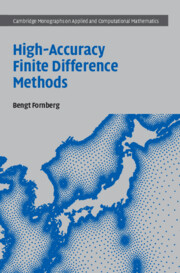Refine search
Actions for selected content:
2 results
5 - Mesh-Free FD Approximations
-
- Book:
- High-Accuracy Finite Difference Methods
- Published online:
- 16 May 2025
- Print publication:
- 05 June 2025, pp 85-111
-
- Chapter
- Export citation

High-Accuracy Finite Difference Methods
-
- Published online:
- 16 May 2025
- Print publication:
- 05 June 2025
